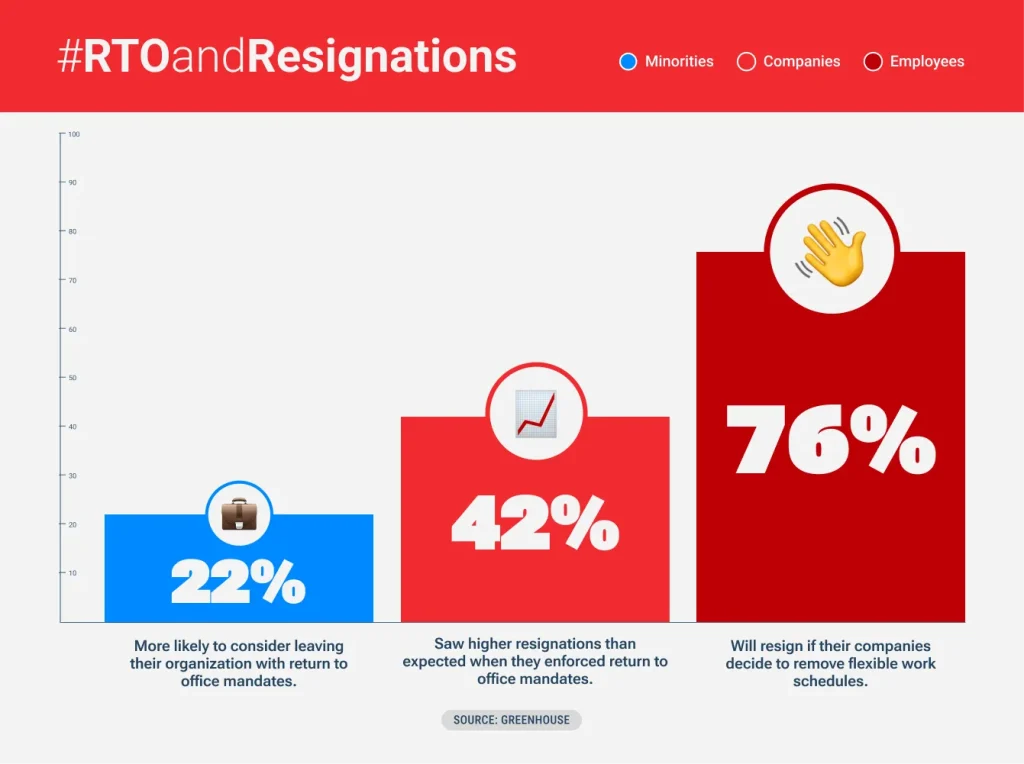What if there was one thing that could make you lose your top performers and ensure you won’t have a diverse team? Just one change in strategy that can make your team more likely to consider leaving. Would you still do it? Maybe not. Yet, C-suite execs have been pushing for this initiative for a while, claiming that it increases revenue and productivity. Yet it’s hard to gauge the increased revenue probability for return-to-office when so many collaborators will choose to leave based on this change in policy.
When it comes to return-to-office mandates, top performers are the first to consider looking for other opportunities if they’re requested to go back to a five-day in-office work week. According to Greenhouse, “76% of employees stand ready to jump ship if their companies decide to pull the plug on flexible work schedules.” But this initiative also affects your organization in other ways, as workers from marginalized communities are more likely to leave a job or not consider a new role if it comes with diminished flexibility.
Listening to your team and their reasons behind their preference or desire to have more flexibility rather than be forced back into the office can develop trust and transparency in your organization.
Workload is the Same, Flexibility not so Much
Imagine being a collaborator at a company where you’ve demonstrated your ability to adapt and produce results despite the changing situation. You learned to work from home during COVID and then realized that you could provide the same amount or even more value while being at home. You have gone through the changes and developed skills to manage your time, or perhaps even finding a more comfortable workstation option. Your work has not suffered and yet you’re requested to come back to the regular 5-day a week office situation, under the guise of improving productivity which hasn’t suffered.
Mental Wellbeing
It’s no secret that we’re in a current global mental health crisis. For some, being able to work from home or only come to the office some days makes all the difference in their coping. Stress can be related to long commute times, office drama, or being stuck in a space that isn’t as friendly for neurodivergent or disabled people, among other possibilities. If your team has been able to withstand all the growing pains of switching towards remote work, and has even succeeded in carrying out their activities, don’t force them into something just because you can. The results won’t be more productivity, but more stress factors that in the long run lead to diminished productivity.
Values also Hold Weight in Choices Regarding Flexibility
Flexibility is something that we can all appreciate. Whether it’s because we are parents who enjoy being able to spend more time with our kids; or that we need to have our own space where we are comfortable in order to better focus; or we want to be able to travel and visit new places while continuing to carry out our everyday tasks. Younger generations such as Gen Z and Alpha are already saying that flexibility is one thing they value in companies. Knowing that your work and your person are appreciated and trusted enough to be able to continue things the way they have.
Coming Back to Top Performers
If you want your business to continue on its path, while also being able to find and hire great collaborators, don’t force anyone to go anywhere. If you feel more comfortable in an office setting, great. There are many coworking spaces you can rent out for yourself. But if you’re only doing it to assert some sort of power or control over how your teammates spend and manage their work day, you might end up with a string of resignations, mainly of you top performers who feel like their talent and effort is not valued.
Don’t miss out, evolve. Find other ways to engage your team to continue feel that they belong and are seen.

Copyright © 2024 EQUALS TRUE. All Rights Reserved.





